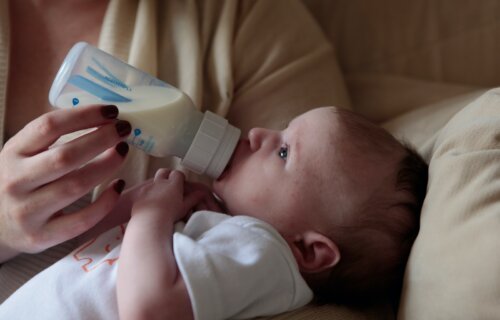LONDON — Most parents want only the best for their children, whether that’s toys, or schools, or food. Unfortunately, a new study claims the baby food industry is preying on these feelings. New research suggests that a majority of the health and nutritional claims on baby formula products don’t have the backing of science. The findings point to the need for revised regulations to protect customers who are paying premium prices for infant products.
Claims on formula products often include advertisements that they help with brain development, immunity, and infant growth. One of the alarming concerns coming out of the study is that parents may believe certain infant formulas provide more benefits than breastfeeding. Aggressive marketing about these various health benefits in infant formula may cause people to forgo breastfeeding or breastfeed less.
In the current study, the team looked at the health and nutritional claims from several baby formula products sold across 15 high, middle, and low-income countries from 2020 to 2022. They also searched the websites of these companies, studied the packaging of products, and the quality of evidence supporting the health claims.
They paid extra attention to all health claims linking a product or an ingredient in the product with a potentially beneficial effect towards the functioning, growth, and development of healthy infants. The researchers identified 757 infant formula products, each linked to an average of two claims and 31 types of claims across all products. Formulas on sale in the United States averaged about four health and nutritional claims per product.
3 in 4 products don’t back up their formula claims
In total, 608 products contained one or more health claims. Fifty-three percent of the products claimed they would help or support the development of the brain, eyes, or nervous system. Another 39 percent claimed they would assist in strengthening or supporting a healthy immune system. Nearly as many products (37%) claimed the baby formula would help support growth and development.
Overall, 41 groups of ingredients were linked to one or more health claims. The most common groups of ingredients included long-chain polyunsaturated fatty acids, prebiotics, probiotics, or synbiotics, and hydrolyzed protein. However, half of the formulas made claims that were not specific towards a specific ingredient.
Results also show 26 percent of the products are on the market worldwide and mention scientific proof backing up their health claims. However, there was no scientific evidence attached to 74 percent of products making specific health claims.
When references were made available, 56 percent reported the findings of clinical trials. The rest of the scientific evidence came from reviews, opinion pieces, or other types of research such as animal studies. Nine in 10 health claims came from clinical trials carrying a high risk of bias. What’s more, 88 percent of registered trials included study authors who received funding from the formula industry or had direct connections to the business.
Who should be vetting baby formula companies?
Since this new study is an observational review, researchers note there are some inconsistencies in the data collection and missing products that could affect the results. Despite the limitations, the study authors did include evidence from several countries and the information was collected in a way to help the team document the relationship between health and nutritional claims and ingredients cited in infant formula.
Nigel Rollins at the World Health Organization wrote in an accompanying editorial that authorities should move to protect consumers from commercial interests. With the many issues plaguing our day-to-day lives, Rollins acknowledges that health professionals and families do not have the time to dive in and vet baby formula health claims.
“Regulatory authorities must therefore decide whether the use of such apparently misleading evidence is acceptable or hold the formula industry to higher standards, require better products based on high-quality evidence, and review standards,” Rollins writes in a statement. “On the basis of this study, governments and regulatory authorities must commit the necessary time and attention to review the claims of formula milk products and the evidence provided and thereby protect infants and parents from commercial interests.”
The study is published in The BMJ.

